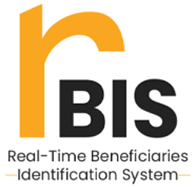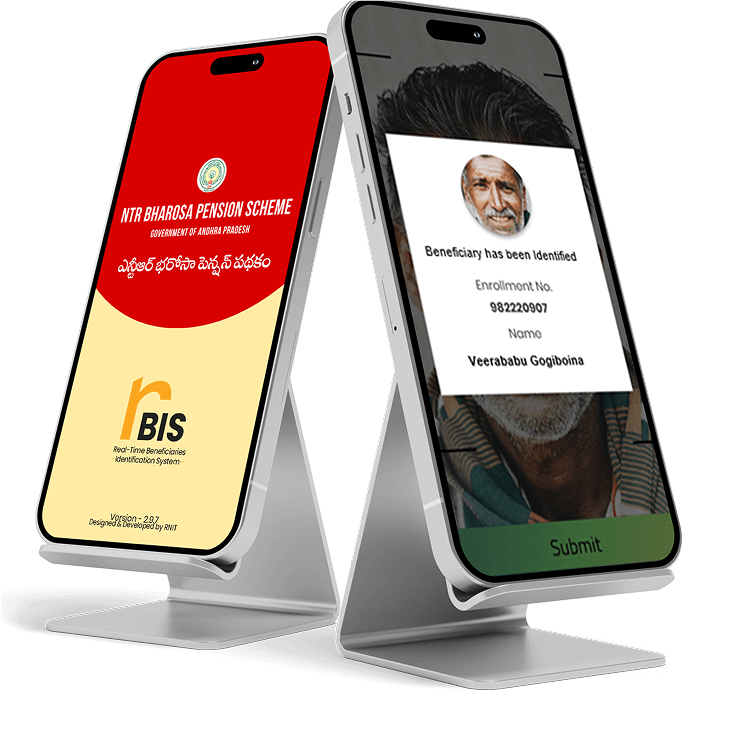
Introduction
The effective delivery of social welfare benefits is a critical challenge for state governments in India. In Andhra Pradesh, ensuring that the intended beneficiaries receive their pensions and other welfare services without delays or errors has long been a priority. Traditional manual verification processes were often marred by inaccuracies, fraudulent claims, and delays, undermining public trust and efficiency. To address these issues, the Social Welfare Department in Andhra Pradesh partnered with RNIT AI Solutions Ltd—a pioneer in digital transformation and artificial intelligence (AI) solutions—to deploy a state-of-the-art Real-time Beneficiary Identification System (RBIS).

Background and Challenges
Before the introduction of RBIS, the Social Welfare Department faced several critical challenges:
Inefficient Verification Processes:
Manual verification and record-keeping often led to errors in beneficiary identification, resulting in delayed pension disbursements and occasional duplication of records.
Fraudulent Claims:
The absence of a robust, automated system made it easier for fraudulent claims to slip through the verification process, thereby misallocating valuable resources meant for the needy.
Data Inaccuracies:
Maintaining updated and accurate records for millions of beneficiaries across a sprawling state like Andhra Pradesh was a daunting task. Inaccuracies in data entry and record-keeping compromised the quality and reliability of the system.
Administrative Overheads:
The extensive manpower and time required for manual verification processes contributed to higher operational costs and inefficiencies within the welfare delivery framework.

The RNIT Solution: Real-time Beneficiary Identification System (RBIS)
RNIT’s RBIS is an advanced, AI-powered platform that utilizes facial recognition technology to accurately identify beneficiaries. The system is designed to work in real time, ensuring immediate verification and seamless integration with existing government databases.
Key Features
AI-based Facial Recognition:
The platform processes facial templates using state-of-the-art machine learning algorithms. With over one crore facial templates being processed daily across its implementations, the system is highly scalable and efficient. In the context of social welfare, this ensures that each beneficiary’s identity is accurately verified every time they avail a service.
Real-Time Data Capture and Synchronization:
RBIS continuously captures and updates beneficiary data, allowing for instant verification at the point of service. This real-time functionality minimizes delays in pension disbursement and other welfare benefits.
Enhanced Transparency and Accountability:
By automating the identification process, RBIS reduces the scope for human error and fraudulent practices. This not only boosts public trust but also ensures that the welfare schemes are delivered to the rightful beneficiaries.
Integration with Government Databases:
The system seamlessly integrates with existing Aadhar and other government records. This unified approach creates a centralized repository of beneficiary data that can be accessed and updated across departments.
Scalability and Robustness:
Designed to operate across vast geographical areas, RBIS is capable of managing data for millions of citizens. Its robust architecture ensures uninterrupted service even during peak demand periods.
Implementation in Andhra Pradesh
The rollout of RBIS in Andhra Pradesh was executed in a phased and meticulously planned manner
Initial Pilot and Customization:
RNIT initiated the project with a pilot phase in select districts. During this phase, the system was tailored to meet the specific needs of the Social Welfare Department. Custom modules were developed to ensure compatibility with local data formats and existing government infrastructure.
Statewide Deployment:
Following the successful pilot, RBIS was scaled for a statewide implementation. Extensive training programs were conducted for government officials to ensure smooth adoption of the new system.
Integration and Data Migration:
A critical component of the implementation involved the integration of RBIS with the state’s central beneficiary database. RNIT worked in close collaboration with IT teams from the Social Welfare Department to ensure a seamless data migration process, thereby minimizing data discrepancies and ensuring real-time updates.
Monitoring and Continuous Improvement:
Post-deployment, the system underwent continuous monitoring to identify and resolve any operational issues promptly. Feedback from end-users was systematically incorporated, allowing for iterative improvements in system performance and user experience.

Impact and Key Achievements
Since its implementation, RBIS has delivered measurable benefits to the Social Welfare Department and, more importantly, to the beneficiaries of Andhra Pradesh
Increased Beneficiary Reach:
The system has successfully processed facial templates for over all the social welfare beneficiaries, ensuring that the social welfare schemes reach millions of families. This scale of operation underscores the reliability and robustness of the technology deployed.
Reduction in Fraudulent Activities:
By employing AI-based facial recognition, RBIS has dramatically reduced fraudulent claims. The automated verification process ensures that only genuine beneficiaries receive their due pensions, thereby safeguarding public funds and enhancing the overall integrity of the welfare system.
Enhanced Service Delivery:
The real-time data capture and verification capabilities of RBIS have significantly reduced the turnaround time for pension disbursements. Beneficiaries now experience faster and more reliable service, contributing to higher levels of public satisfaction and trust in government welfare programs.
Operational Efficiency:
Automating the verification process has led to substantial reductions in administrative overheads. The Social Welfare Department is now able to reallocate resources that were previously dedicated to manual verification tasks, allowing them to focus on strategic improvements and further innovations in service delivery.
Data Accuracy and Transparency:
With continuous real-time updates, the system ensures that beneficiary records are current and accurate. This transparency has enabled more effective monitoring of welfare schemes and improved decision-making regarding resource allocation and policy adjustments.
Future Directions and Sustainability
The success of RBIS in Andhra Pradesh serves as a compelling model for digital transformation in the social welfare sector. Moving forward, RNIT plans to:
Expand Functionality:
Enhance the system with additional features such as predictive analytics to forecast beneficiary trends and integrate more comprehensive data from other government services.
Scale to Other Departments:
Leverage the success of RBIS to offer similar solutions to other departments across India, thereby contributing to the broader Digital India initiative.
Continuous Improvement:
Maintain a robust feedback loop with stakeholders to continually update and refine the system, ensuring it evolves in tandem with changing technological and demographic needs.

Conclusion
RNIT AI Solutions Ltd’s implementation of the Real-time Beneficiary Identification System in Andhra Pradesh represents a significant leap forward in the digital transformation of social welfare. By automating beneficiary verification through AI-powered facial recognition, the system has not only enhanced transparency and efficiency but has also ensured that over all the social welfare beneficiaries receive their due benefits without delay. The successful rollout of RBIS demonstrates RNIT’s capability to deliver scalable, robust, and innovative solutions that address real-world challenges in public service delivery.
As the Social Welfare Department in Andhra Pradesh continues to harness the power of digital technology, RNIT’s RBIS stands as a testament to how advanced AI solutions can transform governance. This partnership has set new benchmarks for efficiency and accountability in the delivery of social welfare benefits, ultimately contributing to a more inclusive and responsive government framework.
With plans for further enhancements and potential expansion into other regions and departments, RNIT AI Solutions Ltd remains committed to driving sustainable digital transformation across India’s public sector.